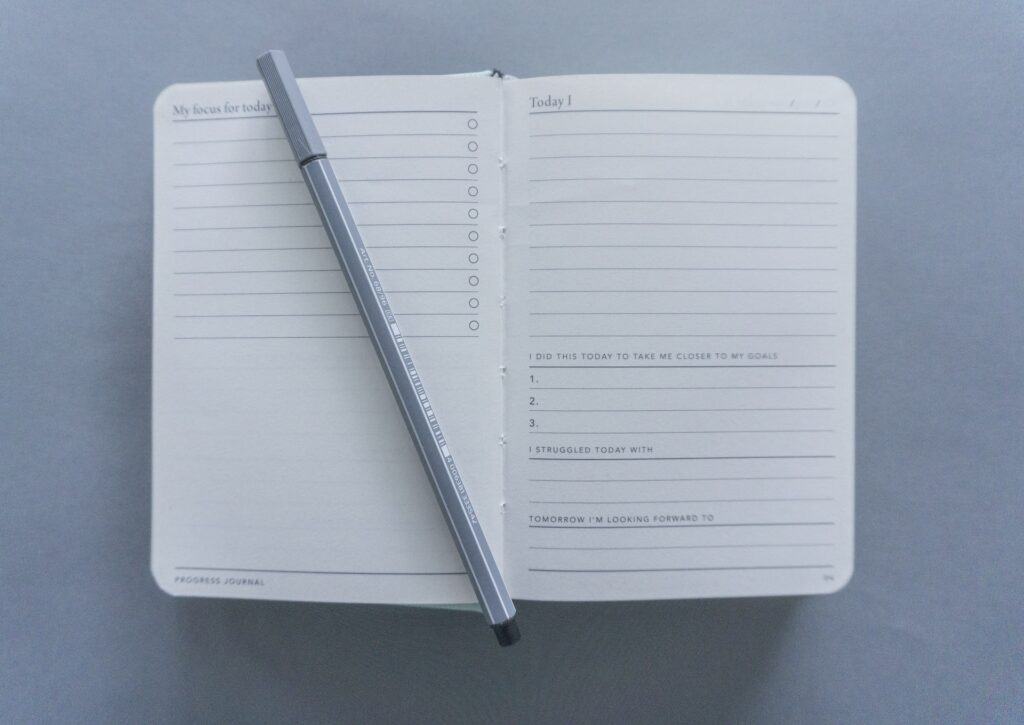Image Source: Unsplash
The practice of self-reflection is an essential part of being a Muslim. It helps us stay on the right path and to continuously strive for self-improvement. In this blog, we’ll explore the benefits of journalling as a way to achieve self-reflection and tazkiyah al-nafs (self-purification) in Islam.
Introduction to Journalling
Journalling is a reflective practice that involves writing down our thoughts and feelings. It is a tool used to help us process our emotions, explore our thoughts and reflect upon our experiences. It can be used to become more self-aware, to better understand our motivations and to gain insight into our behaviour.
The practice of journalling has been around for centuries, with ancient civilizations such as the Greeks and Chinese using it as a way to document their daily lives. In recent years, it has become a popular activity among millennials, with many people using it as a form of self-care and self-expression.
What is Muhasabah and How Does It Relate to Journalling?
Muhasabah is an Islamic concept that refers to the practice of self-reflection and self-accountability. It is the process of examining one’s inner self and taking an honest look at one’s thoughts and actions. This process can be done through prayer, meditation and contemplation.
Journalling is a form of muhasabah and can be used as a tool for self-reflection. Writing down our thoughts and feelings can help us to become more aware of our inner self and to identify areas where we need to improve.
Benefits of Self-Accountability
Self-accountability is an important part of muhasabah. When we take responsibility for our actions, we are better able to recognize the areas where we need to improve. This can help us to stay on the right path and to become better Muslims.
Self-accountability can also help us to become more mindful and aware of our behaviour. We are less likely to make mistakes and more likely to practice righteous deeds. It can also help us to build self-discipline and to better control our emotions and impulses.
The Islamic Perspective on Self-Reflection and Mindset
The Islamic perspective on self-reflection and mindset is rooted in the teachings of the Quran and Sunnah. The Quran encourages us to reflect upon our lives and to strive for self-improvement. It teaches us that we have the power to change our lives for the better and to reach our highest potential.
The Role of Ihsan in Self-Reflection
Ihsan is an Islamic concept that refers to the highest level of faith and practice. It is the belief that Allah is always watching us and that we should strive to be the best versions of ourselves. Ihsan is about doing good for the sake of Allah and striving to be the best Muslims that we can be in every aspect of our lives.
Ihsan can be a powerful tool for self-reflection. It encourages us to be mindful of our thoughts and behaviour and to strive for excellence in all that we do. It can help us to stay on the right path and to constantly strive for self-improvement.
How to Start Journalling
Starting a journal is simple and can be done with just a pen and paper. You can write down your thoughts and feelings and use it as a way to process your emotions and to explore your inner self.
You can also use a digital journal if you prefer. There are many apps available to help you keep track of your thoughts and feelings, such as Day One, Diaro, and Journey.
Tips and Guidelines for Journalling
It is important to remember that journalling is a personal practice and there is no “right” or “wrong” way to do it. However, here are some tips and guidelines to help you get started:
- Set aside time each day to journal.
- Write down your thoughts and feelings without judgement or self-criticism.
- Don’t worry about grammar or spelling – focus on getting your thoughts out.
- Ask yourself questions and explore your thoughts and feelings.
- Reflect on what you have written and try to identify areas for self-improvement.
- Don’t be afraid to express your emotions – it can be a powerful tool for self-reflection.
How to Utilize Journalling for Tazkiyah al-nafs
Tazkiyah al-nafs is the process of purifying the soul and striving for excellence in all that we do. It can be achieved through prayer, contemplation and self-reflection. Journalling can be a useful tool for achieving tazkiyah al-nafs.
When writing in your journal, take the time to reflect on your thoughts and feelings. Ask yourself questions and explore your inner self. Identify areas where you can improve and strive to be the best version of yourself.
Conclusion
Journalling is a powerful tool for self-reflection and tazkiyah al-nafs. It can help us to become more mindful and aware of our thoughts and behaviour, and to strive for excellence in all that we do. We hope that this blog has been helpful in exploring the benefits of journalling for self-reflection in Islam.
Recent Posts
- Optimizing Your Nutrition & Wellness This Ramadhan: A conversation with The Modern Muslim Man
- Daniel Haqiqatjou on Debating, Controlling Emotions, Muslim Skeptic, Tasawwuf, Hijrah & more
- Sh Mu’Aawiyah Tucker (2) – Artificial Intelligence, Crypto Developments, Living on Bitcoin & More
- Discover the Benefits of Journalling for Self-Reflection in Islam
- Islam & Mental Health with a Consultant Psychiatrist: Jinn possession, Depression, Trauma & more









